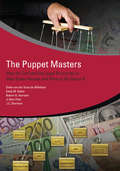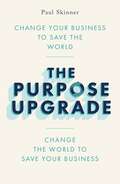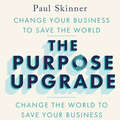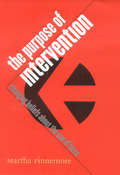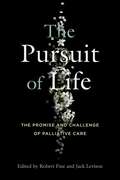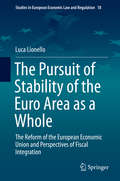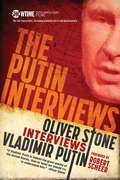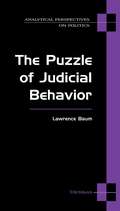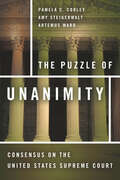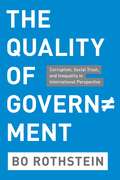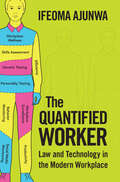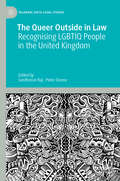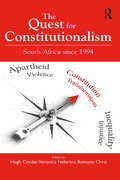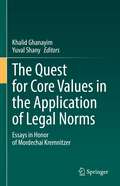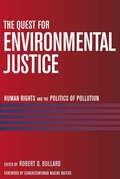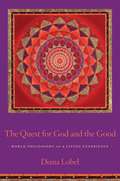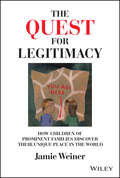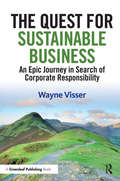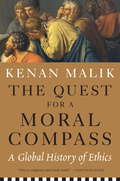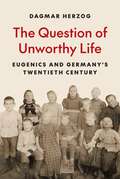- Table View
- List View
The Puppet Masters
by Emile van der Does de Willebois Emily M. Halter Robert A. Harrison Ji Won Park J. C. SharmanBillions in corrupt assets, complex money trails, strings of shell companies and other spurious legal structures. These form the complex web of subterfuge in corruption cases, behind which hides the beneficial owner- the Puppet Master and beneficiary of it all. Linking the beneficial owner to the proceeds of corruption is notoriously hard. With sizable wealth and resources on their side, they exploit transnational constructions that are hard to penetrate and stay aggressively ahead of the game. Nearly all cases of grand corruption have one thing in common. They rely on corporate vehicles- legal structures such as companies, foundations and trusts -- to conceal ownership and control of tainted assets. The Misuse of Corporate Vehicles takes these corporate vehicles as its angle of investigation. It builds upon cases, interviews with investigators, corporate registries and financial institutions, as well as a 'mystery shopping' exercise that provide factual evidence of a criminal practice. This approach is used to understand the nature of the problem and design policy recommendations to facilitate the investigative process by unraveling the complex world of CVs. This lucidly written report is solidly built on step-by step arguments and designed to deliver practical, applicable and well substantiated recommendations. It is intended for use by policy makers in developing national legislation and regulation as well as international standard setters. It also provides helpful information for practitioners engaged in investigating corrupt officials and academics involved in the study of financial crime.
The Purpose Upgrade: Change Your Business to Save the World. Change the World to Save Your Business
by Paul SkinnerUnlock greater profits. Empower happier and more engaged staff. Foster loyalty and connection with customers. Save your business... and the world. How? It all starts with a Purpose Upgrade.History shows that hard times can lead to the greatest opportunities for renewal. The Purpose Upgrade will support readers in leading enterprises that thrive by solving our most important problems.It shows how businesses can create more compelling benefits for customers, build meaningful livelihoods for colleagues, and unlock superior returns for investors by 'repurposing' and revitalising the activities they engage in.Meet the social entrepreneur who repurposed the previously 'boring' trade in office supplies to fund micro-finance initiatives that reach millions of the people most exposed to poverty, so that 'even a bad day at the office saves lives'.Learn how the leaders of a coal-mining business repurposed their enterprise first as an industrial chemicals company and then more spectacularly as a sustainable living business, generating unprecedented shareholder returns by aligning their objectives with the United Nations Sustainable Development Goals. They are now changing the lives of smallholder farmers, re-directing the food system to a more sustainable model, and harnessing the power of the world's biggest brands to provide more nutritious food on a healthier planet. And, most importantly, discover a unique methodology that you can use to make a Purpose Upgrade an always-available event at any level of your own enterprise.There has never been a more urgent need to change our businesses to save the world or a more opportune time to change the world to save our businesses.
The Purpose Upgrade: Change Your Business to Save the World. Change the World to Save Your Business
by Paul SkinnerUnlock greater profits. Empower happier and more engaged staff. Foster loyalty and connection with customers. Save your business... and the world. How? It all starts with a Purpose Upgrade.History shows that hard times can lead to the greatest opportunities for renewal. The Purpose Upgrade will support readers in leading enterprises that thrive by solving our most important problems.It shows how businesses can create more compelling benefits for customers, build meaningful livelihoods for colleagues, and unlock superior returns for investors by 'repurposing' and revitalising the activities they engage in.Meet the social entrepreneur who repurposed the previously 'boring' trade in office supplies to fund micro-finance initiatives that reach millions of the people most exposed to poverty, so that 'even a bad day at the office saves lives'.Learn how the leaders of a coal-mining business repurposed their enterprise first as an industrial chemicals company and then more spectacularly as a sustainable living business, generating unprecedented shareholder returns by aligning their objectives with the United Nations Sustainable Development Goals. They are now changing the lives of smallholder farmers, re-directing the food system to a more sustainable model, and harnessing the power of the world's biggest brands to provide more nutritious food on a healthier planet. And, most importantly, discover a unique methodology that you can use to make a Purpose Upgrade an always-available event at any level of your own enterprise.There has never been a more urgent need to change our businesses to save the world or a more opportune time to change the world to save our businesses.
The Purpose Upgrade: Change Your Business to Save the World. Change the World to Save Your Business
by Paul SkinnerUnlock greater profits. Empower happier and more engaged staff. Foster loyalty and connection with customers. Save your business... and the world. How? It all starts with a Purpose Upgrade.History shows that hard times can lead to the greatest opportunities for renewal. The Purpose Upgrade will support readers in leading enterprises that thrive by solving our most important problems.It shows how businesses can create more compelling benefits for customers, build meaningful livelihoods for colleagues, and unlock superior returns for investors by 'repurposing' and revitalising the activities they engage in.Meet the social entrepreneur who repurposed the previously 'boring' trade in office supplies to fund micro-finance initiatives that reach millions of the people most exposed to poverty, so that 'even a bad day at the office saves lives'.Learn how the leaders of a coal-mining business repurposed their enterprise first as an industrial chemicals company and then more spectacularly as a sustainable living business, generating unprecedented shareholder returns by aligning their objectives with the United Nations Sustainable Development Goals. They are now changing the lives of smallholder farmers, re-directing the food system to a more sustainable model, and harnessing the power of the world's biggest brands to provide more nutritious food on a healthier planet. And, most importantly, discover a unique methodology that you can use to make a Purpose Upgrade an always-available event at any level of your own enterprise.There has never been a more urgent need to change our businesses to save the world or a more opportune time to change the world to save our businesses.
The Purpose of Intervention: Changing Beliefs about the Use of Force (Cornell Studies in Security Affairs)
by Martha FinnemoreViolence or the potential for violence is a fact of human existence. Many societies, including our own, reward martial success or skill at arms. The ways in which members of a particular society use force reveal a great deal about the nature of authority within the group and about its members' priorities. Martha Finnemore uses one type of force, military intervention, as a window onto the shifting character of international society. She examines the changes, over the past 400 years, in why countries intervene militarily as well as in the ways they have intervened. It is not the fact of intervention that has altered, she says, but rather the reasons for and meaning behind intervention-the conventional understanding of the purposes for which states can and should use force. Finnemore looks at three types of intervention: collecting debts, addressing humanitarian crises, and acting against states perceived as threats to international peace. In all three, she finds that what is now considered "obvious" was vigorously contested or even rejected by people in earlier periods for well-articulated and logical reasons. A broad historical perspective allows her to explicate long-term trends: the steady erosion of force's normative value in international politics, the growing influence of equality norms in many aspects of global political life, and the increasing importance of law in intervention practices.
The Pursuit of Life: The Promise and Challenge of Palliative Care
by Robert Fine, Jack Levison and Kelsey SpinnatoThis volume examines crucial concerns in palliative care, including the proper balance between comfort and cure for the patient, the integration of spiritual well-being, and the challenges of providing care in the absence of basic medical services and supplies.In the first section, palliative-care pioneers Constance Dahlin, Eduardo Bruera, Neil MacDonald, and Declan Walsh recount the early history of the discipline. Part 2 discusses the role of poetry, prose, plays, and other aspects of the humanities in the practice of palliative care. Part 3 explores essential current issues in the field, including autonomy, the use of opioids, and the impact of artificial intelligence on the evolution of palliative care. The final section focuses on the spiritual dimensions of pain and suffering.Rich with anecdotes and personal stories and featuring contributions from pioneers and current practitioners, The Pursuit of Life is an essential assessment of the past, present, and future of palliative care. In addition to the editors, the contributors include W. Andrew Achenbaum, Stacy L. Auld, Elena Pagani Bagliacca, Costantino Benedetti, Courtenay Bruce, Eduardo Bruera, Joseph Calandrino, Jim Cleary, Constance Dahlin, Andrea Ferrari, Mauro Ferrari, Joseph J. Fins, Bettie Jo Tennon Hightower, Kathryn B. Kirkland, Robin W. Lovin, Neil MacDonald, Charles Millikan, Dominique J. Monlezun, Tullio Proserpio, Giovanna Sironi, Daniel P. Sulmasy, and Declan Walsh.
The Pursuit of Stability of the Euro Area as a Whole: The Reform of the European Economic Union and Perspectives of Fiscal Integration (Studies in European Economic Law and Regulation #18)
by Luca LionelloThis book analyses the ongoing reform of the European economic union in the light of the new objective of ‘stability of the euro area as a whole’ in Article 136(3) TFEU. On the basis of the relevant legal sources, it qualifies this objective as the obligation to preserve the existence of the monetary union, the establishment of which was an EU goal laid down in Article 3(4) TEU. While to date the objective has been achieved through fiscal and macroeconomic consolidation in the member states and the activation of stabilisation mechanisms in cases of emergency, the book argues that full stability requires a better system of economic governance, either through a process of partial fiscal centralisation or the return to a more efficient and sustainable market discipline of public finances. It also analyses the concrete legal challenges these raise, including compliance with the conferral principle, the longstanding democratic deficit of the governance and the balance between financial solidarity and fiscal responsibility.
The Putin Interviews: Oliver Stone Interviews Vladimir Putin
by Robert Scheer Oliver StoneWITH SUBSTANTIAL MATERIAL NOT INCLUDED IN THE DOCUMENTARY Academy Award winner Oliver Stone was able to secure what journalists, news organizations, and even other world leaders have long coveted: extended, unprecedented access to Russian President Vladimir Putin. The Putin Interviews are culled from more than a dozen interviews with Putin over a two-year span—never before has the Russian leader spoken in such depth or at such length with a Western interviewer. No topics are off limits in the interviews, which first occurred during Stone’s trips to meet with NSA whistleblower Edward Snowden in Moscow and most recently after the election of President Donald Trump. Prodded by Stone, Putin discusses relations between the United States and Russia, allegations of interference in the US election, and Russia’s involvement with conflicts in Syria, Ukraine, and elsewhere across the globe. Putin speaks about his rise to power and details his relationships with Presidents Clinton, George W. Bush, Obama, and Trump. The exchanges are personal, provocative, and at times surreal. At one point, Stone asks, “Why did Russia hack the election?”; at another, Stone introduces him to Stanley Kubrick’s 1964 Cold War satire "Dr. Strangelove," which the two watch together. Stone has interviewed controversial world leaders before, including Hugo Chavez, Fidel Castro, and Benjamin Netanyahu. But The Putin Interviews, in its unmediated access to one of the most enigmatic and powerful men in the world, can only be compared to the series of conversations between David Frost and Richard Nixon we now refer to as “The Nixon Interviews” of 1977. The book will also contain references and sources that give readers a deeper understanding of the topics covered in the interviews and make for a more robust reading experience.
The Puzzle of Judicial Behavior
by Lawrence BaumFrom local trial courts to the United States Supreme Court, judges' decisions affect the fates of individual litigants and the fate of the nation as a whole. Scholars have long discussed and debated explanations of judicial behavior. This book examines the major issues in the debates over how best to understand judicial behavior and assesses what we actually know about how judges decide cases. It concludes that we are far from understanding why judges choose the positions they take in court. Lawrence Baum considers three issues in examining judicial behavior. First, the author considers the balance between the judges' interest in the outcome of particular cases and their interest in other goals such as personal popularity and lighter workloads. Second, Baum considers the relative importance of good law and good policy as bases for judges' choices. Finally Baum looks at the extent to which judges act strategically, choosing their own positions after taking into account the positions that their fellow judges and other policy makers might adopt. Baum argues that the evidence on each of these issues is inconclusive and that there remains considerable room for debate about the sources of judges' decisions. Baum concludes that this lack of resolution is not the result of weaknesses in the scholarship but from the difficulty in explaining human behavior. He makes a plea for diversity in research. This book will be of interest to political scientists and scholars in law and courts as well as attorneys who are interested in understanding judges as decision makers and who want to understand what we can learn from scholarly research about judicial behavior. Lawrence Baum is Professor of Political Science, Ohio State University.
The Puzzle of Unanimity: Consensus on the United States Supreme Court
by Artemus Ward Pamela C. Corley Amy SteigerwaltThe U. S. Supreme Court typically rules on cases that present complex legal questions. Given the challenging nature of its cases and the popular view that the Court is divided along ideological lines, it's commonly assumed that the Court routinely hands down equally-divided decisions. Yet the justices actually issue unanimous decisions in approximately one third of the cases they decide. Drawing on data from the U. S. Supreme Court database, internal court documents, and the justices' private papers,The Puzzle of Unanimityprovides the first comprehensive account of how the Court reaches consensus. Pamela Corley, Amy Steigerwalt, and Artemus Ward propose and empirically test a theory of consensus; they find consensus is a function of multiple, concurrently-operating forces that cannot be fully accounted for by ideological attitudes. In this thorough investigation, the authors conclude that consensus is a function of the level of legal certainty and its ability to constrain justices' ideological preferences.
The Quality of Government: Corruption, Social Trust, and Inequality in International Perspective
by Bo RothsteinThe relationship between government, virtue, and wealth has held a special fascination since Aristotle, and the importance of each frames policy debates today in both developed and developing countries. While it's clear that low-quality government institutions have tremendous negative effects on the health and wealth of societies, the criteria for good governance remain far from clear. In this pathbreaking book, leading political scientist Bo Rothstein provides a theoretical foundation for empirical analysis on the connection between the quality of government and important economic, political, and social outcomes. Focusing on the effects of government policies, he argues that unpredictable actions constitute a severe impediment to economic growth and development--and that a basic characteristic of quality government is impartiality in the exercise of power. This is borne out by cross-sectional analyses, experimental studies, and in-depth historical investigations. Timely and topical, The Quality of Government tackles such issues as political legitimacy, social capital, and corruption.
The Quality of Government: Corruption, Social Trust, and Inequality in International Perspective
by Bo RothsteinThe relationship between government, virtue, and wealth has held a special fascination since Aristotle, and the importance of each frames policy debates today in both developed and developing countries. While it’s clear that low-quality government institutions have tremendous negative effects on the health and wealth of societies, the criteria for good governance remain far from clear. In this pathbreaking book, leading political scientist Bo Rothstein provides a theoretical foundation for empirical analysis on the connection between the quality of government and important economic, political, and social outcomes. Focusing on the effects of government policies, he argues that unpredictable actions constitute a severe impediment to economic growth and development—and that a basic characteristic of quality government is impartiality in the exercise of power. This is borne out by cross-sectional analyses, experimental studies, and in-depth historical investigations. Timely and topical, The Quality of Government tackles such issues as political legitimacy, social capital, and corruption.
The Quantified Worker: Law and Technology in the Modern Workplace
by Ifeoma AjunwaThe information revolution has ushered in a data-driven reorganization of the workplace. Big data and AI are used to surveil workers and shift risk. Workplace wellness programs appraise our health. Personality job tests calibrate our mental state. The monitoring of social media and surveillance of the workplace measure our social behavior. With rich historical sources and contemporary examples, The Quantified Worker explores how the workforce science of today goes far beyond increasing efficiency and threatens to erase individual personhood. With exhaustive detail, Ifeoma Ajunwa shows how different forms of worker quantification are enabled, facilitated, and driven by technological advances. Timely and eye-opening, The Quantified Worker advocates for changes in the law that will mitigate the ill effects of the modern workplace.
The Queer Outside in Law: Recognising LGBTIQ People in the United Kingdom (Palgrave Socio-Legal Studies)
by Peter Dunne Senthorun RajThis book contributes to current debates about “queer outsides” and “queer outsiders” that emerge from tensions in legal reforms aimed at improving the lives of lesbian, gay, bisexual, transgender, intersex, and queer people in the United Kingdom. LGBTIQ people in the UK have moved from being situated as “outlaws” – through prohibitions on homosexuality or cross-dressing – to respectable “in laws” – through the emerging acceptance of same-sex families and self-identified genders. From the partial decriminalisation of homosexuality in the Sexual Offences Act 1967, to the provision of a bureaucratic mechanism to amend legal sex in the Gender Recognition Act 2004, bringing LGBTIQ people “inside” the law has prompted enormous activist and academic commentary on the desirability of inclusion-focused legal and social reforms. Canvassing an array of current socio-legal debates on colonialism, refugee law, legal gender recognition, intersex autonomy and transgender equality, the contributing authors explore “queer outsiders” who remain beyond the law’s reach and outline the ways in which these outsiders might seek to “come within” and/or “stay outside” law. Given its scope, this modern work will appeal to legal scholars, lawyers, and activists with an interest in gender, sex, sexuality, race, migration and human rights law.
The Quest for Community: A Study in the Ethics of Order and Freedom
by Robert Nisbet"The Quest for Community" stands among the most important social critiques ever written. The first book by the man the New York Times calls "one of our most original social thinkers", Robert Nisbet's study explores how individualism and statism have flourished while the primary sources of human community - the family, neighborhoods, the church, and voluntary organizations - have grown weaker. First published in 1953, this timeless work is a seminal contribution to the understanding of the spiritual and intellectual crisis of Western Society. With a new introduction by William A. Schambra that places the book in a contemporary perspective, "Quest for Community" deserves to be reread in the light of events that have confirmed its provocative thesis.
The Quest for Constitutionalism: South Africa since 1994
by Veronica Federico Hugh CorderThis volume provides a timely assessment on the progress made towards the achievement of a constitutional democracy in South Africa. The chapters collectively present an in-depth analysis of the development of the legal system and of the implications of the Constitution for the social configuration of power. To what extent has the vision of constitutionalism contained in the Constitution been realised? Primarily concerned with the impact of laws and the salience of their existence and enforcement for South Africans, the work highlights the importance of placing the constitutional regime in its historical, cultural, social, economic and political context. The book further recognises the importance of the South African constitutional provisions for transnational or globalised constitutionalism more broadly. It contains contributions from South African scholars, as well as European authors, bringing in new analytical angles and adding a specific comparative dimension. Through the prism of South Africa, the authors discuss the innovative character of constitutional and legal provisions in terms of both constitution-making and law-making processes and their contents. This book provides analysis that will be relevant to scholars, students and practitioners, specifically those interested in International Relations, Law, Sociology of Law, and African Studies, as well as socio-political comparative studies.
The Quest for Core Values in the Application of Legal Norms: Essays in Honor of Mordechai Kremnitzer
by Yuval Shany Khalid GhanayimRelations between societal values and legal doctrine are inevitably complex given the time lag between law and social reality, and the sociological space between legal communities involved in the development and application of the law and non-legal communities affected by it. It falls on open-ended concepts, such as proportionality, human rights, dignity, freedom, and truth, and on legal frameworks for balancing competing rights and interests, such as self-defense, command or corporate responsibility, and restrictions on freedom of expression, to negotiate chronic tensions between law and society and to bridge existing gaps. The present volume contains chapters by leading experts – former judges on constitutional courts and international courts, and some of the world’s leading criminal law, public law, and international law scholars – offering their points of view and professional analysis of legal notions and doctrines that serve as hubs for the interpretation, application, and contestation of core values, which in turn constitute building blocks of the rule of law. The shared perspective on the interplay between values and legal rules in public law, criminal law, and international law is likely to render the publication a valuable resource for both theoreticians and practitioners, law students, and seasoned legal experts working in diverse legal fields.
The Quest for Environmental Justice: Human Rights and the Politics of Pollution
by Robert D. Bullard Maxine WatersCapturing the voices of frontline warriors who are battling environmental injustice and human rights abuses at the grassroots level around the world, this follow–up to Dr. Robert D. Bullard's highly acclaimed Unequal Protection: Environmental Justice and Communities of Color, examines the policies and globalization trends that place people of color and the poor at special risk Part I of this work presents an overview of the early environmental justice movement and highlights key leadership roles assumed by women activists. Part II examines the lives of people living in "sacrifice zones"—toxic corridors (such as Louisiana's infamous "Cancer Alley") where high concentrations of polluting industries are found. Part III explores land use, land rights, resource extraction, and sustainable development conflicts, including Chicano struggles in America's Southwest. Part IV examines human rights and global justice issues, including an analysis of South Africa's legacy of environmental racism and the corruption and continuing violence plaguing the oil–rich Niger Delta. Together, the diverse contributors to this essential anthology present an inspiring and illuminating picture of the environmental justice movement that is challenging government and industry in the first decade of the twenty–first century.
The Quest for God and the Good: World Philosophy as a Living Experience
by Diana LobelDiana Lobel takes readers on a journey across Eastern and Western philosophical and religious traditions to discover a beauty and purpose at the heart of reality that makes life worth living. Guided by the ideas of ancient thinkers and the insight of the philosophical historian Pierre Hadot, The Quest for God and the Good treats philosophy not as an abstract, theoretical discipline, but as a living experience. For centuries, human beings have struggled to know why we are here, whether a higher being or dimension exists, and whether our existence is fundamentally good. Above all, we want to know whether the search for God and the good will bring happiness. Following in the path of the ancient philosophers, Lobel directly connects conceptions of God or an Absolute with notions of the good, illuminating diverse classical texts and thinkers. She explores the Bible and the work of Plato, Aristotle, Augustine, Maimonides, al-Farabi, and al-Ghazali. She reads the Tao Te Ching, I Ching, Bhagavad Gita, and Upanishads, as well as the texts of Theravada, Mahayana, and Zen Buddhism, and traces the repercussions of these works in the modern thought of Alfred North Whitehead, Iris Murdoch, Alasdair MacIntyre, and Charles Taylor. While each of these texts and thinkers sets forth a distinct and unique vision, all maintain that human beings find fulfillment in their contact with beauty and purpose. Rather than arriving at one universal definition of God or the good, Lobel demonstrates the aesthetic value of multiple visions presented by many thinkers across cultures. The Quest for God and the Good sets forth a path of investigation and discovery culminating in intellectual and spiritual communion.
The Quest for Good Governance:
by Alina Mungiu-PippidiWhy do some societies manage to control corruption so that it manifests itself only occasionally, while other societies remain systemically corrupt? This book is about how societies reach that point when integrity becomes the norm and corruption the exception in regard to how public affairs are run and public resources are allocated. It primarily asks what lessons we have learned from historical and contemporary experiences in developing corruption control, which can aid policy-makers and civil societies in steering and expediting this process. Few states now remain without either an anticorruption agency or an Ombudsman, yet no statistical evidence can be found that they actually induce progress. Using both historical and contemporary studies and easy to understand statistics, Alina Mungiu-Pippidi looks at how to diagnose, measure and change governance so that those entrusted with power and authority manage to defend public resources.
The Quest for Legitimacy: How Children of Prominent Families Discover Their Unique Place in the World
by Jamie WeinerDiscover how the children of prominent families pursue their own path while contributing to their family&’s legacy In The Quest for Legitimacy: How Children of Prominent Families Discover Their Unique Place in the World, accomplished family and private wealth consultant Dr. James Weiner delivers a unique and eye-opening discussion of the Rising Generation&’s quest for self-determination in the shadow of a larger-than-life family. The author relies on qualitative research conducted on wealthy families to explore topics like: Rites of passage in prominent families and what liberation for young family members actually looks and feels like Separating from and returning to your family while finding people to trust on your journey How to deal with the long shadows cast by wealthy family membersPerfect for members of wealthy and accomplished families, as well as the people who advise them, The Quest for Legitimacy is an essential read for anyone navigating the complex dynamics of accomplished families.
The Quest for Sustainable Business: An Epic Journey in Search of Corporate Responsibility
by Wayne VisserIn January 2010, author, academic and social entrepreneur Dr Wayne Visser set off on a nine-month, 20-country "quest" to talk to entrepreneurs, business leaders and innovators and learn about how companies in all parts of the world can and are helping to tackle the world's most pressing social and environmental problems. His aim was to explore the many varieties of global approaches to sustainable business practices first-hand and to share some of the most innovative global examples.The result is this treasure trove of a book, full of stories, ideas, links to more than 100 video interviews, best practices and tools for making sustainable business work in a myriad of different contexts, cultures and settings. Besides sharing insights from his 2010 "CSR Quest World Tour", the author captures his professional experiences and the evolution of sustainable business over the past 20 years.The path begins in Africa and winds its way through Asia, North America, Europe, Australasia and Latin America. The author shares what he has learned in encounters with mega-corporations and small farmers, and conversations with CEOs and social entrepreneurs. There are facts and figures about world trends, and interviews with thought leaders and activists. This is a tale that consciously weaves the personal and the professional, mixing anecdotes and case studies. It looks outwards and reflects inwards, and is both autobiography and the life story of a global movement.
The Quest for a Moral Compass
by Kenan MalikThe story of the global search for moral truthsIn this remarkable and groundbreaking book, Kenan Malik explores the history of moral thought as it has developed over three millennia, from Homer's Greece to Mao's China, from ancient India to modern America. It tells the stories of the great philosophers, and breathes life into their ideas, while also challenging many of our most cherished moral beliefs.Engaging and provocative, The Quest for a Moral Compass confronts some of humanity's deepest questions. Where do values come from? Is God necessary for moral guidance? Are there absolute moral truths? It also brings morality down to earth, showing how, throughout history, social needs and political desires have shaped moral thinking. It is a history of the world told through the history of moral thought, and a history of moral thought that casts new light on global history.
The Question of Life's Meaning: An African Perspective
by Aribiah David AttoeIn answering the question of life’s meaning, the African perspective is only just beginning to emerge. While this is true, a critical examination of African theories of meaningfulness, the possibility of life’s meaninglessness, as well as ideas about the proper mode/mood for living with the meaninglessness of life are largely underexplored within the African philosophical tradition. This book provides several plausible accounts of meaning in/of life from an African perspective, examines the relationship between death and life’s meaningfulness, and explores the possibility of life’s meaninglessness, proposing the “philosophy of indifference” as the proper mode/mood for living with the meaninglessness of life.
The Question of Unworthy Life: Eugenics and Germany’s Twentieth Century
by Dagmar HerzogThe dark history of eugenic thought in Germany from the nineteenth century to today—and the courageous countervoicesBetween 1939 and 1945, Nazi genocide claimed the lives of nearly three hundred thousand people diagnosed with psychiatric illness or cognitive deficiencies. Not until the 1980s would these murders, as well as the coercive sterilizations of some four hundred thousand others classified as &“feeble-minded,&” be officially acknowledged as crimes at all. The Question of Unworthy Life charts this history from its origins in prewar debates about the value of disabled lives to our continuing efforts to unlearn eugenic thinking today.Drawing on a wealth of rare archival evidence, Dagmar Herzog sheds light on how Germany became the only modern state to implement a plan to eradicate cognitive impairment from the entire body politic. She traces how eugenics emerged from the flawed premise that intellectual deficiency was biologically hereditary, and how this crude explanatory framework diverted attention from the actual economic and clinical causes of disability. Herzog describes how the vilification of the disabled was dressed up as the latest science and reveals how Christian leaders and prominent educators were complicit in amplifying and legitimizing Nazi policies.Exposing the driving forces behind the Third Reich&’s first genocide and its persistent legacy today, The Question of Unworthy Life recovers the stories of the unsung advocates for disability rights who challenged the aggressive victimization of the disabled and developed alternative approaches to cognitive impairment based on ideals of equality, mutuality, and human possibility.
